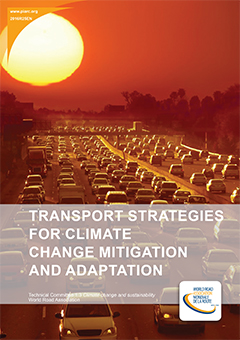Transport Strategies for Climate Change Mitigation and Adaptation

The transport sector is a major and quickly growing source of greenhouse gas emissions. Since 1970, greenhouse gas emissions from the transportation sector have more than doubled, increasing at a faster rate than any other end-use sector, and on-road greenhouse gas emissions have more than tripled, accounting for about 80 percent of the increase in total transport greenhouse gas emissions. Global transport greenhouse gas emissions are expected to increase faster than other sectors without aggressive and sustained mitigation policies, which are critical to reverse historic trends and support a sustainable future.
The transport sector is also very vulnerable to climate change impacts. As a significant and growing contributor to greenhouse gas emissions, it is critical that the transport sector minimizes its emissions. Additionally, climate change impacts can cause expensive damage to transport infrastructure and disruption to travel and freight. Since reliable transport is an essential part of all countries' economic and social wellbeing, countries must find ways to adapt to climate change and increase the resilience of transport to extreme weather.
This report presents a variety of approaches of different countries to both mitigate climate change by reducing greenhouse gas emissions from transport and adapting transportation systems and infrastructure to the impacts of climate change. Information was collected during a global survey of interested parties. The survey responses indicated that climate change mitigation is typically approached as an environmental issue, often employing government targets, laws or policies to reduce greenhouse gas emissions. By comparison, adaptation strategies are less developed in most countries and are more often viewed as an asset management issue. Adaptation strategies are often limited in their effectiveness due to the lack of reliable information on future impacts, lack of financial resources and the demand of short term needs compared to long term impacts of climate change.
Information sheet
- Date: 2016
- Author(s): Comité technique 1.3 - Changement climatique et durabilité Technical Committee 1.3 - Climate Change and Sustainability
- Domain(s): Environment
- Type: 2016R25EN - Technical Report
- PIARC Ref.: 2016R25EN
- ISBN: 978-2-84060-420-4
- Number of pages: 56